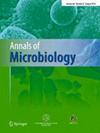甜椒秸秆生物炭对土壤微生物群落和连作黄瓜生长的影响
IF 3.4
4区 生物学
Q2 BIOTECHNOLOGY & APPLIED MICROBIOLOGY
引用次数: 0
摘要
本研究评估了从作物秸秆中提取的生物炭作为温室农业连续单一种植土壤退化的解决方案,重点关注其对土壤微生物群落和黄瓜植株生长的影响。我们分析了从番茄秸秆(TSB)、甜椒秸秆(SPSB)和茄子秸秆(ESB)中提取的生物炭,评估了它们的养分含量、阳离子交换能力和吸附率。本研究考察了三种浓度(2.5%、5% 和 7.5% w/w)更有前景的 SPSB 对土壤性质和黄瓜生长的影响。与 TSB 和 ESB 相比,SPSB 的氮、磷、钾含量明显更高,吸附能力也更强。浓度为 5%(重量比)的 SPSB 显著改善了黄瓜的生长,与对照组相比,株高增加了 13.01%,茎粗增加了 20.79%,叶面积增加了 50.26%,干重增加了 58.56%。高通量测序显示,该浓度显著改变了土壤微生物群落结构,提高了细菌和真菌的多样性。它增加了有益菌群(固着菌、放线菌、芽孢杆菌),改变了真菌群落,减少了子囊菌和曲霉,提高了青霉的丰度。功能基因组分析表明,细菌代谢途径和真菌复制与表达基因丰富。在受连续单一栽培影响的温室中,SPSB(尤其是在 5%w/w 浓度下)是一种有效的土壤改良剂。这种方法是提高土壤健康和作物生产力的一种可持续方法。本文章由计算机程序翻译,如有差异,请以英文原文为准。
Effects of sweet pepper straw biochar on soil microbial communities and growth of continuously cropped cucumber
This study evaluates biochar from crop residues as a solution to soil degradation in continuous monoculture within greenhouse agriculture, focusing on its impact on soil microbial communities and cucumber plant growth. We analyzed biochar derived from tomato straw (TSB), sweet pepper straw (SPSB), and eggplant straw (ESB), assessing their nutrient content, cation exchange capacity, and adsorption rates. This study examined the effects of three concentrations (2.5%, 5%, and 7.5% w/w) of the more promising SPSB on soil properties and cucumber growth. SPSB showed significantly higher levels of nitrogen, phosphorus, and potassium, along with superior adsorption capacity compared to TSB and ESB. The 5% w/w SPSB concentration notably improved cucumber growth, increasing plant height by 13.01%, stem thickness by 20.79%, leaf area by 50.26%, and dry weight by 58.56% relative to the control. High-throughput sequencing revealed this concentration significantly altered soil microbial community structure, enhancing bacterial and fungal diversity. It increased beneficial bacterial groups (Firmicutes, Actinobacteria, Bacillus) and modified fungal communities, with a decrease in Ascomycota and Aspergillus and shifts in Penicillium abundance. Functional genomic analysis indicated enrichment in bacterial metabolic pathways and fungal replication and expression genes. SPSB, especially at a 5% w/w concentration, emerges as an effective soil amendment in greenhouses affected by continuous monoculture. This approach represents a sustainable method to enhance soil health and crop productivity.
求助全文
通过发布文献求助,成功后即可免费获取论文全文。
去求助
来源期刊

Annals of Microbiology
生物-生物工程与应用微生物
CiteScore
6.40
自引率
0.00%
发文量
41
审稿时长
3.2 months
期刊介绍:
Annals of Microbiology covers these fields of fundamental and applied microbiology:
general, environmental, food, agricultural, industrial, ecology, soil, water, air and biodeterioration.
The journal’s scope does not include medical microbiology or phytopathological microbiology.
Papers reporting work on bacteria, fungi, microalgae, and bacteriophages are welcome.
Annals of Microbiology publishes Review Articles, Original Articles, Short Communications, and Editorials.
Originally founded as Annali Di Microbiologia Ed Enzimologia in 1940, Annals of Microbiology is an official journal of the University of Milan.
 求助内容:
求助内容: 应助结果提醒方式:
应助结果提醒方式:


